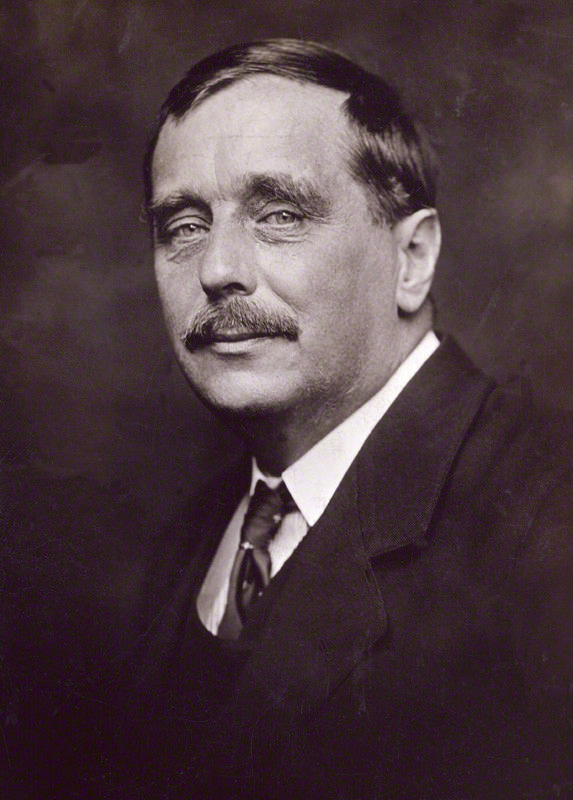Wells, H G (Herbert George)
H G Wells was born on 21
st September 1866 in Bromley, England. (
Read more about where he was born and spent his early years.) His father was a professional cricketer and owned a shop selling sports equipment and china. The shop was not particularly successful and, when an accident meant Wells’s father could no longer play cricket to earn money, H G Wells and his two brothers were sent to be apprentices to help with the family income. Wells struggled to settle into his apprenticeships, one with a draper and another with a chemist, and much preferred to spend his time in the library of Uppark country house, where his mother worked. Reading was a hugely influential part of Wells’s life. After Wells broke his leg aged eight, his father brought him library books to keep him occupied, and he spent a lot of time immersed in the worlds created by writers such as Charles Dickens; Wells continued his journey into literature in the country house library. (
Explore the house and gardens of Uppark country house on the National Trust website.) In 1883, Wells became a pupil-teacher at a grammar school. He went on to study Biology as well as taking further teaching positions; at one point he taught A A Milne, the author of the Winnie the Pooh books.
H G Wells married his cousin in 1890; however, they separated three years later when Wells began a relationship with one of his students. He was unfaithful throughout his relationships, fathering four children with three different women. Despite the assumptions that could be made about his attitude to women based on his romantic life, Wells was a keen supporter of women’s emancipation, and his 1909 novel
Ann Veronica is just one example of Wells as social commentator, using his work to voice his attitudes and beliefs. As well as discussing what he saw as society’s problems, Wells used his writing to create what he believed to be better societies in his utopian fiction, such as
A Modern Utopia (1905). He proved to be incredibly forward thinking in many ways, and a number of his imagined technological inventions actually became reality! Space travel, planes, tanks, nuclear weapons and even World War II were all predicted by Wells. He even imagined the Internet, saying that
‘identical matter [...] will appear almost simultaneously everywhere’ and imagining the news to be reported much as it is today:
‘Daily papers may [...] give place to hourly papers, each with the last news of the last sixty minutes photographically displayed.’ (Source:
How Futurist H. G. Wells, Foresaw the Invention of the World Wide Web – Douglas Fields)
Wells was clearly a visionary, believing
“We must not allow the clock and the calendar to blind us to the fact that each moment of life is a miracle and mystery”. He is most famous for his science fiction writing and, along with Jules Verne (who wrote
Around the World in Eighty Days), is credited with having invented the genre, and he is commonly known as the father of science fiction. The imaginary worlds, situations, characters and technologies he created in his work have been copied over and over, and H G Wells himself has appeared in popular television shows such as
Doctor Who and he has been reimagined as a woman for the Syfy channel’s
Warehouse 13 and NBC’s
Timeless. In an episode of the CBS series
The Big Bang Theory, Wells’s time machine makes an appearance when the full-size movie prop is bought by Leonard on an online auction site. Owning Wells’s time machine isn’t just a dream for television characters, as the 2016 documentary
How to Build a Time Machine proves. It follows the journey of two scientists’ attempts to recreate Wells’s time machine in real life!
Wells’s novel approach to the science fiction genre has been termed ‘Wells’s Law’, with the basic premise being that only one fantastical thing should occur in the story; everything else should remain normal. Wells says himself,
‘The thing that makes such imaginations interesting is their translation into commonplace terms and a rigid exclusion of other marvels from the story’. (Source:
SFE: Wells's Law) In
The Time Machine (1895) the single fantastical thing is of course, the time machine itself. Wells explains:
‘The more impossible the story I had to tell, the more ordinary must be the setting’, (Source:
The Innovations of HG Wells) and so the circumstances and character of the time traveller are ordinary to his social class. The only extraordinary thing about him is his journey in the time machine itself. Similarly, in
The War of the Worlds (1898), Wells imagines Martians invading the UK. But that’s all. The humans, the setting, everything except the Martians invading, is all normal. Famously, a radio broadcast of an adaptation of
The War of the Worlds in 1938 was said to have been so realistic that listeners who tuned in after the broadcast was introduced believed that the report was factual and that Martians were invading the UK at that moment!
You can listen to the original broadcast here. Wells’s reasoning behind his law is simple:
‘Nothing remains interesting, where anything may happen’. (Source:
SFE: Wells's Law)
Wells proved to be a prolific writer, completing more than 114 books and over 50 novels in a number of different genres. He was nominated for the Nobel Prize in Literature four times (1921, 1932, 1935, 1946). The outbreak of World War I had a huge impact on Wells, who was a pacifist at heart, saying,
‘If we don’t end war, war will end us’ and ‘Our true nationality is mankind’. This impact is clearly seen in his writing, which became more critical commentary and less narrative. As such, his later work has been criticised by writers such as George Orwell (who wrote dystopian fiction such as
Nineteen Eighty-Four and
Animal Farm), who said, ‘
Since 1920 he has squandered his talents’. (Source:
George Orwell: Wells, Hitler and the World State) Wells disagreed, attesting
‘I had rather be called a journalist than an artist’.
Wells was diagnosed with diabetes in his early 60s and used his influence to raise money for an in-patient facility for diabetes patients at King’s College Hospital. Following the success of his appeal, Wells suggested that a diabetic association should be formed, of which he was the president. The association co-founded by Wells in 1934 is still running today, now known as Diabetes UK. (
Read about Wells’s relationship with the charity here.). Wells died at his home aged 79 in 1946, with the announcement of his death saying,
‘Not merely Britain but the civilised world has lost a notable and in some ways unique figure’.





